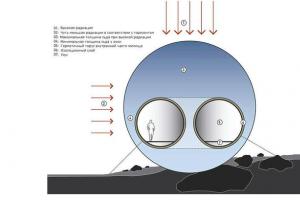(Fairy tale)
Lived in the world small flower. Nobody knew that he was on earth. He grew up alone in a vacant lot; cows and goats did not go there, and children from the pioneer camp never played there. No grass grew in the vacant lot, but only old gray stones lay, and between them there was dry, dead clay. Only the wind was blowing through the wasteland; like a grandfather sower, the wind carried seeds and sowed them everywhere - both in the black damp earth and on a bare stone wasteland. In the good black earth, flowers and herbs were born from seeds, but in stone and clay, the seeds died. And one day a seed fell from the wind, and it nestled in a hole between stone and clay. This seed languished for a long time, and then it became saturated with dew, disintegrated, released thin root hairs, stuck them into the stone and clay and began to grow. This is how that little flower began to live in the world. There was nothing for him to eat in stone and clay; drops of rain that fell from the sky fell on the top of the earth and did not penetrate to its root, but the flower lived and lived and grew little by little higher. He raised the leaves against the wind, and the wind died down near the flower; specks of dust fell from the wind onto the clay, which the wind brought from the black, fat earth; and in those dust particles there was food for the flower, but the dust particles were dry. To moisten them, the flower guarded the dew all night and collected it drop by drop on its leaves. And when the leaves became heavy with dew, the flower lowered them, and the dew fell down; it moistened the black earthen dust that the wind brought and corroded the dead clay. During the day the flower was guarded by the wind, and at night by the dew. He worked day and night to live and not die. He grew his leaves large so that they could stop the wind and collect dew. However, it was difficult for the flower to feed only from dust particles that fell from the wind, and also to collect dew for them. But he needed life and overcame his pain from hunger and fatigue with patience. Only once a day did the flower rejoice: when the first ray of the morning sun touched its tired leaves. If the wind did not come to the wasteland for a long time, then the little flower became ill, and it no longer had enough strength to live and grow. The flower, however, did not want to live sadly; therefore, when he was completely sad, he dozed off. Still, he constantly tried to grow, even if his roots gnawed at bare stone and dry clay. At such a time, its leaves could not be saturated with full strength and become green: one vein was blue, another red, the third blue or gold. This happened because the flower lacked food, and its torment was indicated in the leaves by different colors. The flower itself, however, did not know this: after all, it was blind and did not see itself as it is. In mid-summer the flower opened its corolla at the top. Before that, it looked like grass, but now it has become a real flower. Its corolla was composed of the petals of a simple light color, clear and strong, like a star. And, like a star, it shone with a living, flickering fire, and it was visible even on a dark night. And when the wind came to the wasteland, it always touched the flower and carried its smell with it. And then one morning the girl Dasha was walking past that vacant lot. She lived with her friends in a pioneer camp, and this morning she woke up and missed her mother. She wrote a letter to her mother and took the letter to the station so that it would arrive quickly. On the way, Dasha kissed the envelope with the letter and envied him that he would see his mother sooner than she did. At the edge of the wasteland, Dasha felt a fragrance. She looked around. There were no flowers nearby, only small grass grew along the path, and the wasteland was completely bare; but the wind came from the wasteland and brought from there a quiet smell, like the calling voice of a small unknown life. Dasha remembered one fairy tale, her mother told her a long time ago. The mother spoke about a flower that was always sad for its mother - a rose, but it could not cry, and only in the fragrance did its sadness pass. “Maybe this flower misses its mother there, like me,” Dasha thought. She went into the wasteland and saw that small flower near the stone. Dasha had never seen such a flower before - neither in a field, nor in a forest, nor in a book in a picture, nor in a botanical garden, anywhere. She sat down on the ground near the flower and asked him: - Why are you like this? “I don’t know,” answered the flower. - Why are you different from others? The flower again did not know what to say. But for the first time he heard a person’s voice so close, for the first time someone looked at him, and he did not want to offend Dasha with silence. “Because it’s difficult for me,” answered the flower. - What is your name? - Dasha asked. “Nobody calls me,” said the little flower, “I live alone.” Dasha looked around in the wasteland. - Here is a stone, here is clay! - she said. - How do you live alone, how did you grow from clay and not die, you little one? “I don’t know,” answered the flower. Dasha leaned towards him and kissed his glowing head. The next day, all the pioneers came to visit the little flower. Dasha led them, but long before reaching the vacant lot, she ordered everyone to take a breath and said: - Hear how good it smells. That's how he breathes. The pioneers stood around the small flower for a long time and admired it like a hero. Then they walked around the entire wasteland, measured it in steps and counted how many wheelbarrows with manure and ash needed to be brought in to fertilize the dead clay. They wanted the land in the wasteland to become good. Then the little flower, unknown by name, will rest, and from its seeds beautiful children will grow and will not die, the best flowers shining with light, which are not found anywhere. The pioneers worked for four days, fertilizing the land in the wasteland. And after that they went traveling to other fields and forests and never came to the wasteland again. Only Dasha came one day to say goodbye to the little flower. Summer was already ending, the pioneers had to go home, and they left. And the next summer Dasha again came to the same pioneer camp. Throughout the long winter, she remembered a small flower, unknown by name. And she immediately went to the vacant lot to check on him. Dasha saw that the wasteland was now different, it was now overgrown with herbs and flowers, and birds and butterflies were flying over it. The flowers gave off a fragrance, the same as that little working flower. However, last year's flower, which lived between the stone and clay, was no longer there. He must have died last fall. The new flowers were also good; they were only a little worse than that first flower. And Dasha felt sad that the old flower was no longer there. She walked back and suddenly stopped. Grew between two tight stones new flower- exactly the same as that old color, only a little better and even more beautiful. This flower grew from the middle of the crowded stones; he was lively and patient, like his father, and even stronger than his father, because he lived in stone. It seemed to Dasha that the flower was reaching out to her, that it was calling her to itself with the silent voice of its fragrance.Andrey Platonovich PLATONOV
UNKNOWN FLOWER
(Fairy tale)
Once upon a time there lived a little flower. Nobody knew that he was on earth. He grew up alone in a vacant lot; cows and goats did not go there, and children from the pioneer camp never played there. No grass grew in the vacant lot, but only old gray stones lay, and between them there was dry, dead clay. Only the wind was blowing through the wasteland; like a grandfather sower, the wind carried seeds and sowed them everywhere - both in the black damp earth and on a bare stone wasteland. In the good black earth, flowers and herbs were born from seeds, but in stone and clay, the seeds died.
And one day a seed fell from the wind, and it nestled in a hole between stone and clay. This seed languished for a long time, and then it became saturated with dew, disintegrated, released thin root hairs, stuck them into the stone and clay and began to grow.
This is how that little flower began to live in the world. There was nothing for him to eat in stone and clay; drops of rain that fell from the sky fell on the top of the earth and did not penetrate to its root, but the flower lived and lived and grew little by little higher. He raised the leaves against the wind, and the wind died down near the flower; specks of dust fell from the wind onto the clay, which the wind brought from the black, fat earth; and in those dust particles there was food for the flower, but the dust particles were dry. To moisten them, the flower guarded the dew all night and collected it drop by drop on its leaves. And when the leaves became heavy with dew, the flower lowered them, and the dew fell down; it moistened the black earthen dust that the wind brought and corroded the dead clay.
During the day the flower was guarded by the wind, and at night by the dew. He worked day and night to live and not die. He grew his leaves large so that they could stop the wind and collect dew. However, it was difficult for the flower to feed only from dust particles that fell from the wind, and also to collect dew for them. But he needed life and overcame his pain from hunger and fatigue with patience. Only once a day did the flower rejoice; when the first ray of the morning sun touched its tired leaves.
If the wind did not come to the wasteland for a long time, then the little flower became ill, and it no longer had enough strength to live and grow.
The flower, however, did not want to live sadly; therefore, when he was completely sad, he dozed off. Still, he constantly tried to grow, even if his roots gnawed at bare stone and dry clay. At such a time, its leaves could not be saturated with full strength and become green: one vein was blue, another red, the third blue or gold. This happened because the flower lacked food, and its torment was indicated in the leaves by different colors. The flower itself, however, did not know this: after all, it was blind and did not see itself as it is.
In mid-summer the flower opened its corolla at the top. Before that, it looked like grass, but now it has become a real flower. Its corolla was composed of petals of a simple light color, clear and strong, like a star. And, like a star, it shone with a living, flickering fire, and it was visible even on a dark night. And when the wind came to the wasteland, it always touched the flower and carried its smell with it.
And then one morning the girl Dasha was walking past that vacant lot. She lived with her friends in a pioneer camp, and this morning she woke up and missed her mother. She wrote a letter to her mother and took the letter to the station so that it would arrive quickly. On the way, Dasha kissed the envelope with the letter and envied him that he would see his mother sooner than she did.
At the edge of the wasteland, Dasha felt a fragrance. She looked around. There were no flowers nearby, only small grass grew along the path, and the wasteland was completely bare; but the wind came from the wasteland and brought from there a quiet smell, like the calling voice of a small unknown life. Dasha remembered one fairy tale, her mother told her a long time ago. The mother spoke about a flower that was still sad for its mother - a rose, but it could not cry, and only in the fragrance did its sadness pass.
“Maybe this flower misses its mother there, like me,” thought Dasha.
She went into the wasteland and saw that small flower near the stone. Dasha has never seen such a flower before - neither in the field, nor in the forest, nor in a picture of a book, nor in a botanical garden, anywhere. She sat down on the ground near the flower and asked him:
Why are you like this?
“I don’t know,” answered the flower.
Why are you different from others?
The flower again did not know what to say. But for the first time he heard a person’s voice so close, for the first time someone looked at him, and he did not want to offend Dasha with silence.
Because it’s difficult for me,” answered the flower.
What is your name? - Dasha asked.
“Nobody calls me,” said the little flower, “I live alone.”
Dasha looked around in the wasteland.
Here is a stone, here is clay! - she said. - How do you live alone, how did you grow from clay and not die, you little one?
“I don’t know,” answered the flower.
Dasha leaned towards him and kissed his glowing head.
The next day, all the pioneers came to visit the little flower. Dasha led them, but long before reaching the vacant lot, she ordered everyone to take a breath and said:
Hear how good it smells. That's how he breathes.
The pioneers stood around the small flower for a long time and admired it like a hero. Then they walked around the entire wasteland, measured it in steps and counted how many wheelbarrows with manure and ash needed to be brought in to fertilize the dead clay.
Once upon a time there lived a little flower. Nobody knew that he was on earth. He grew up alone in a vacant lot; cows and goats did not go there, and children from the pioneer camp never played there. No grass grew in the vacant lot, but only old gray stones lay, and between them there was dry, dead clay. Only the wind was blowing through the wasteland; like a grandfather sower, the wind carried seeds and sowed them everywhere - both in the black damp earth and on a bare stone wasteland. In the good black earth, flowers and herbs were born from seeds, but in stone and clay, the seeds died.
And one day a seed fell from the wind, and it nestled in a hole between stone and clay. This seed languished for a long time, and then it became saturated with dew, disintegrated, released thin root hairs, stuck them into the stone and clay and began to grow.
This is how that little flower began to live in the world. There was nothing for him to eat in stone and clay; drops of rain that fell from the sky fell on the top of the earth and did not penetrate to its root, but the flower lived and lived and grew little by little higher. He raised the leaves against the wind, and the wind died down near the flower; specks of dust fell from the wind onto the clay, which the wind brought from the black, fat earth; and in those dust particles there was food for the flower, but the dust particles were dry. To moisten them, the flower guarded the dew all night and collected it drop by drop on its leaves. And when the leaves became heavy with dew, the flower lowered them, and the dew fell down; it moistened the black earthen dust that the wind brought and corroded the dead clay.
During the day the flower was guarded by the wind, and at night by the dew. He worked day and night to live and not die. He grew his leaves large so that they could stop the wind and collect dew. However, it was difficult for the flower to feed only from dust particles that fell from the wind, and also to collect dew for them. But he needed life and overcame his pain from hunger and fatigue with patience. Only once a day did the flower rejoice: when the first ray of the morning sun touched its tired leaves.
If the wind did not come to the wasteland for a long time, then the little flower became ill, and it no longer had enough strength to live and grow.
The flower, however, did not want to live sadly; therefore, when he was completely sad, he dozed off. Still, he constantly tried to grow, even if his roots gnawed at bare stone and dry clay. At such a time, its leaves could not be saturated with full strength and become green: one vein was blue, another red, the third blue or gold. This happened because the flower lacked food, and its torment was indicated in the leaves by different colors. The flower itself, however, did not know this: after all, it was blind and did not see itself as it is.
In mid-summer the flower opened its corolla at the top. Before that, it looked like grass, but now it has become a real flower. Its corolla was composed of petals of a simple light color, clear and strong, like a star. And, like a star, it shone with a living, flickering fire, and it was visible even on a dark night. And when the wind came to the wasteland, it always touched the flower and carried its smell with it.
And then one morning the girl Dasha was walking past that vacant lot. She lived with her friends in a pioneer camp, and this morning she woke up and missed her mother. She wrote a letter to her mother and took the letter to the station so that it would arrive quickly. On the way, Dasha kissed the envelope with the letter and envied him that he would see his mother sooner than she did.
At the edge of the wasteland, Dasha felt a fragrance. She looked around. There were no flowers nearby, only small grass grew along the path, and the wasteland was completely bare; but the wind came from the wasteland and brought from there a quiet smell, like the calling voice of a small unknown life. Dasha remembered one fairy tale, her mother told her a long time ago. The mother spoke about a flower that was still sad for its mother - a rose, but it could not cry, and only in the fragrance did its sadness pass.
“Maybe this flower misses its mother there, like me,” Dasha thought.
She went into the wasteland and saw that small flower near the stone. Dasha had never seen such a flower before - neither in a field, nor in a forest, nor in a book in a picture, nor in a botanical garden, nowhere. She sat down on the ground near the flower and asked him:
- Why are you like this?
“I don’t know,” answered the flower.
- Why are you different from others?
The flower again did not know what to say. But for the first time he heard a person’s voice so close, for the first time someone looked at him, and he did not want to offend Dasha with silence.
“Because it’s difficult for me,” answered the flower.
- What is your name? – Dasha asked.
“Nobody calls me,” said the little flower, “I live alone.”
Dasha looked around in the wasteland.
- Here is a stone, here is clay! - she said. - How do you live alone, how did you grow from clay and not die, you little one?
“I don’t know,” answered the flower.
Dasha leaned towards him and kissed his glowing head.
The next day, all the pioneers came to visit the little flower. Dasha led them, but long before reaching the vacant lot, she ordered everyone to take a breath and said:
- Hear how good it smells. That's how he breathes.
The pioneers stood around the small flower for a long time and admired it like a hero. Then they walked around the entire wasteland, measured it in steps and counted how many wheelbarrows with manure and ash needed to be brought in to fertilize the dead clay.
They wanted the land in the wasteland to become good. Then the little flower, unknown by name, will rest, and from its seeds beautiful children will grow and will not die, the best flowers shining with light, which are not found anywhere.
The pioneers worked for four days, fertilizing the land in the wasteland. And after that they went traveling to other fields and forests and never came to the wasteland again. Only Dasha came one day to say goodbye to the little flower. Summer was already ending, the pioneers had to go home, and they left.
Cartoon based on the story “Unknown Flower” by Andrei Platonov. Created by 4th grade students at the “Be your own director” club
And the next summer Dasha again came to the same pioneer camp. Throughout the long winter, she remembered a small flower, unknown by name. And she immediately went to the vacant lot to check on him.
Dasha saw that the wasteland was now different, it was now overgrown with herbs and flowers, and birds and butterflies were flying over it. The flowers gave off a fragrance, the same as that little working flower.
However, last year's flower, which lived between the stone and clay, was no longer there. He must have died last fall. The new flowers were also good; they were only a little worse than that first flower. And Dasha felt sad that the old flower was no longer there. She walked back and suddenly stopped. Between two close stones a new flower grew - exactly the same as that old flower, only a little better and even more beautiful. This flower grew from the middle of the crowded stones; he was lively and patient, like his father, and even stronger than his father, because he lived in stone.
It seemed to Dasha that the flower was reaching out to her, that it was calling her to itself with the silent voice of its fragrance.
Andrey Platonovich PLATONOV
UNKNOWN FLOWER
(Fairy tale)
Once upon a time there lived a little flower. Nobody knew that he was on earth. He grew up alone in a vacant lot; cows and goats did not go there, and children from the pioneer camp never played there. No grass grew in the vacant lot, but only old gray stones lay, and between them there was dry, dead clay. Only the wind was blowing through the wasteland; like a grandfather sower, the wind carried seeds and sowed them everywhere - both in the black damp earth and on a bare stone wasteland. In the good black earth, flowers and herbs were born from seeds, but in stone and clay, the seeds died.
And one day a seed fell from the wind, and it nestled in a hole between stone and clay. This seed languished for a long time, and then it became saturated with dew, disintegrated, released thin root hairs, stuck them into the stone and clay and began to grow.
This is how that little flower began to live in the world. There was nothing for him to eat in stone and clay; drops of rain that fell from the sky fell on the top of the earth and did not penetrate to its root, but the flower lived and lived and grew little by little higher. He raised the leaves against the wind, and the wind died down near the flower; specks of dust fell from the wind onto the clay, which the wind brought from the black, fat earth; and in those dust particles there was food for the flower, but the dust particles were dry. To moisten them, the flower guarded the dew all night and collected it drop by drop on its leaves. And when the leaves became heavy with dew, the flower lowered them, and the dew fell down; it moistened the black earthen dust that the wind brought and corroded the dead clay.
End of free trial.








